Extension Today
News from and about the 1890 Land-Grant Extension SystemMessage from the Chair

Dr. Carolyn Williams Executive Associate Director, Prairie View A&M University
The best-tasting fruits and vegetables I have tasted come from my home garden. It is such a deliciously rewarding experience, which produces many benefits. When was the last time you planted fruits and vegetables in a garden plot or container?
Home and community gardens are more prevalent today than ever before and encourage family time and community engagement while addressing food insecurity and healthy produce. Urban and other farms may provide farmers and community members with important opportunities to participate in and support the local economy as vendors at farmers markets, wholesale sellers to neighbors and community members or as produce sources for community-supported agriculture programs.
Starting a garden whether community, home or school can make real and lasting changes in communities. There are other positive benefits such as physical activity and stress reduction, increasing access to fresh food, improving soil and water quality, and creating the opportunity to teach about nutrition, agriculture and ecology.
Enjoy this month’s newsletter featuring the life-changing miracles that come from our soil.
School gardens: Return to our roots
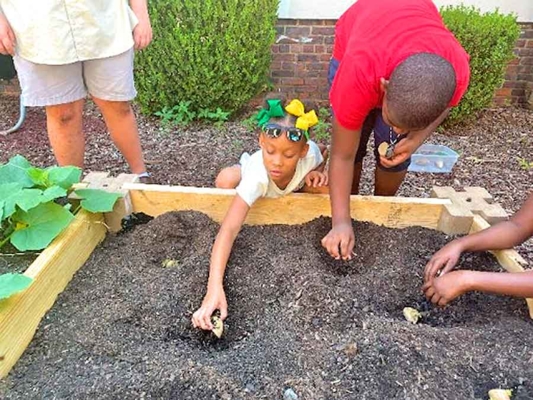
By Dr. Roosevelt Robinson
During the 2022-2023 school year, the Alabama Extension at Alabama A&M University partnered with Montgomery Public Schools (MPS), national home improvement product retailers, local feed and seed stores, Parent Teacher Associations and other organizations to establish school fruit and vegetable gardens. A committee consisting of Alabama Extension personnel, school administrators, teachers and other school and community leaders identified garden types, supplies, funding opportunities and how to incorporate gardening into school curricula.
Program delivery
Utilizing a hybrid approach to program delivery, students participated in Zoom videoconferencing and workday sessions on seed starting, plant propagation, soil and plant nutrition basics, watering and irrigation, and pest management. Properly supervised, students in grades 3 to 5 also made use of various hand and power tools to assemble raised bed fruit and vegetable garden plots. Students also learned the 4 Rs of green living: reduce, reuse, recycle and repurpose. For instance, instead of plastic seed starter pots and trays, students reused and repurposed toilet and paper towel rolls to start and plant seedlings, reducing the number of rolls that end up in landfills.
Gardens can empower today’s youths to return to our gardening roots and become resilient youths, self-sustaining adults and stewards of the environment.
Discover new era in gardening with innovative onsite disease diagnosis programs
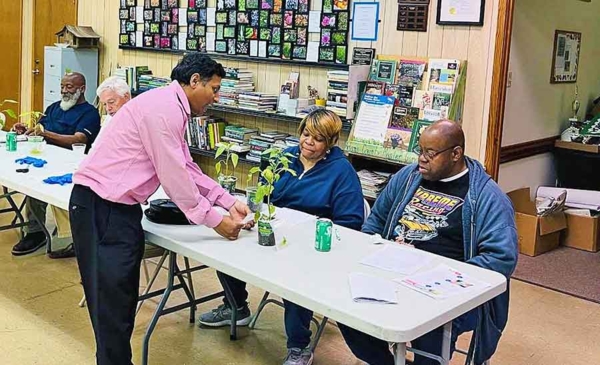
Timely, accurate and cost-effective diagnosis of plant diseases provides crucial support in controlling plant diseases and producing quality crops in gardens. Plant diseases are generally difficult to diagnose and can cause considerable damage to vegetable production.
While some common plant diseases may be easy to identify in the field with a trained eye, many symptoms displayed by unhealthy plants could also be due to poor growing conditions, pests, chemical damage from fertilizers or fungicides, and plants could even be under attack by more than one pathogen at a time. If not diagnosed and treated immediately, some pathogens can spread very quickly.
The application of onsite disease detection technologies has been gaining popularity in recent years, revolutionizing the way plant diseases are rapidly identified and managed in gardens. For example, Immunostrip assays function similarly to rapid COVID-19 antigen tests – all one has to do is add diseased plant tissue to a buffer, then add a test strip to the mix, and they will have a result in minutes. No more guesswork or searching the internet for solutions! Gain precision care, save time and resources, and empower yourself with in-depth plant knowledge.
Our program aims to achieve widespread adoption of these technologies through comprehensive training, demonstrations and educational workshops targeting underserved communities and limited-resource farmers in Mississippi. Say goodbye to uncertainty due to inaccurate disease ID and embrace our ongoing Onsite Disease Diagnosis Program.
A summer of STEM success
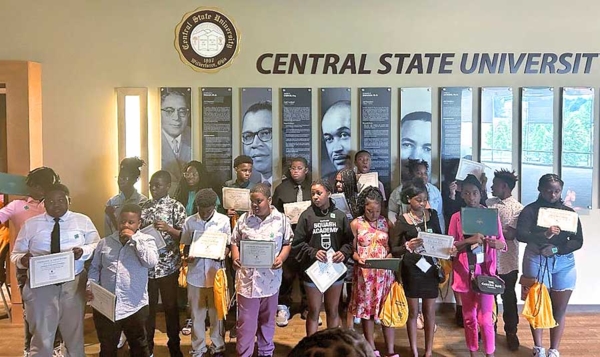
This summer, Central State University partnered with the U.S. Department of Agriculture (USDA) and the Department of Defense (DoD) STEM Education Consortium to host two incredible educational experiences: The Seed to Bloom Ag-STEM Institute Residential Summer Camp and the DSEC STEM Summer Bridge Academy.
From June 18 to 30, Central State University’s (CSU) main campus buzzed with the excitement of young minds eager to learn and grow. In two separate cohorts, the Seed to Bloom camp welcomed 56 middle school students, engaging them in an array of STEM-related subjects. The camp focused on integrating agriculture with science, technology, engineering and math (STEM). Students delved into topics ranging from animal and plant science to water chemistry and gardening. Along with hands-on activities and field trips, they explored professional development and leadership skills, aligning with the nationally recognized 4-H youth development program.
Complementing this, the DSEC STEM Summer Bridge Academy catered to 19 rising high school students, including two incoming college freshmen. This intensive, two-week residential camp centered on preparing participants for the demands of college life. With a keen focus on college algebra, introductory chemistry, biology, computer science and engineering, the academy empowered students with the tools necessary to excel in their future academic pursuits.
Both programs offered no-cost participation, ensuring that youths from various backgrounds had an equal opportunity to explore new horizons. As the participants returned home, the seeds of knowledge planted during these camps were ready to bloom.
Sponsored by CSU, the USDA and the DoD STEM Education Consortium, these events represent an investment in our community's youths and a step toward a better tomorrow. Here's to another successful summer of inspiring the next generation of scientists, engineers and leaders.
Innovation, collaboration: DSU Master Gardener program

The mission of the Master Gardener program is to extend knowledge of research-based sustainable gardening practices to the community. Master Gardeners spend countless hours helping citizens in their respective communities with the planting, maintenance and harvesting of produce and ornamentals. This assistance is either rendered free of charge or at a nominal cost.
Delaware Cooperative Extension — the land-grant partnership between Delaware State University (DSU) and the University of Delaware — trains Master Gardener volunteers to address horticulture questions from residents throughout the state.
For the month of August, DSU Cooperative Extension highlights the work of Megan Pleasanton, DSU alumna, Extension educator and Master Gardener coordinator, concerning innovative gardening.
Exposing youths to agriculture
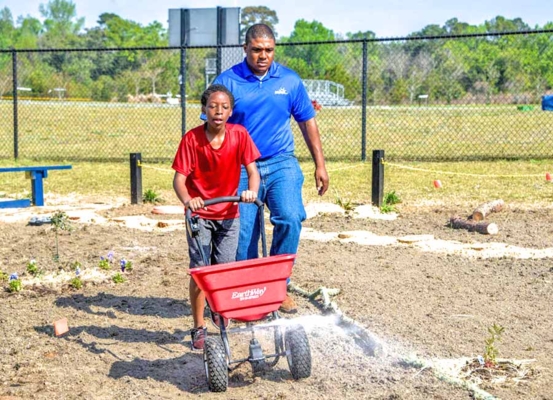
Georgia youths in Lowndes County are learning firsthand the impact of agriculture in the state and world.
Local students are involved in the planting, caretaking and harvesting of crops as part of the Valdosta School Garden and Orchard Project, which consists of raised bed gardens, orchards and pollinator gardens. They are introduced to carrots, broccoli, greens, cabbage, citrus, grapes, sweet potatoes, pears, pomegranates, blueberries, native ornamental plants and composting. They also sometimes cook the crops for their school.
Joshua Dawson, Fort Valley State University’s (FVSU) Lowndes County Extension agent, said the goals are to encourage healthy eating and encourage interest in STEM (science, technology, engineering and mathematics) so that the teachers can use the garden as part of their curriculum, introduce students to agriculture and encourage gardening.
“Students learn where their food comes from and how it is produced,” Dawson said, noting educators encourage interest in agriculture industry occupations. “These gardens have had a lot of success and impacted students in different ways.”
The Valdosta School Garden and Orchard Project is supported by local sponsors and members of the community, FVSU and the University of Georgia Extension in Lowndes County, and Lowndes County Master Gardener Extension Volunteers.
Kentucky State Extension personnel demonstrate container gardens to Louisville group
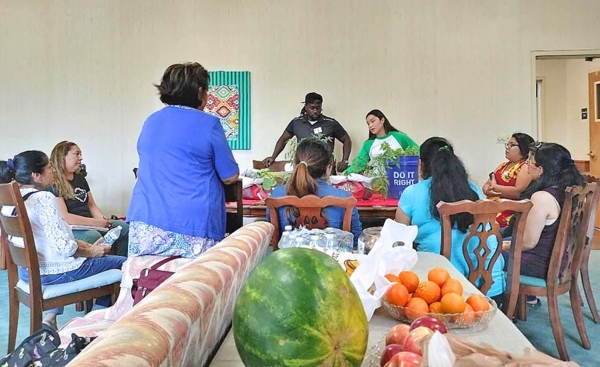
Kentucky State University Cooperative Extension personnel Von Barnes and Jessica Marquez demonstrated growing good in small spaces, specifically in container gardens, to Eastern Area Community Ministries (EACM) in Louisville.
EACM is a community organization that serves immigrant and refugee members of the community. They hold meetings on the fourth Tuesday of every month to provide a space for their members to come together. The meetings primarily serve Spanish-speaking members and are focused on helping them improve their financial literacy and develop important life skills. These meetings address the unique challenges faced by the immigrant and refugee communities. Marquez, bilingual community resource development agent, frequently works with this group.
At one meeting, the topic of food insecurity was brought up, and sustainable food production and self-sufficiency were discussed. Marquez invited Barnes, urban agriculture Extension agent, to join the group for a discussion and demonstration. Barnes provided participants with seeds and demonstrated how to grow in containers.
Langston University Cooperative Extension supports limited-resource producers
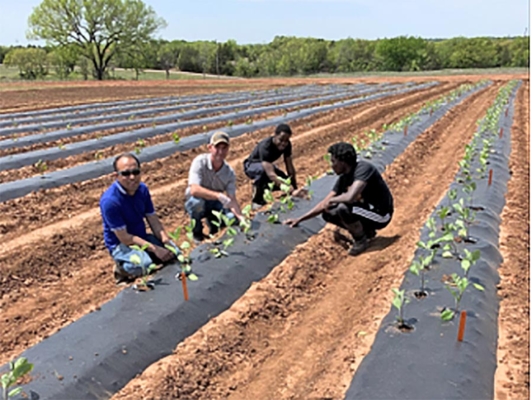
Field cultivation of warm-loving vegetables and spice crops is challenged in Oklahoma due to unpredictable weather and the increased pressure of weeds, disease and insect pests.
Notably, the population growth and rise of ethnic diversity in larger cities in Oklahoma and neighboring states have created a market opportunity for local producers who grow high-value crops such as tomatoes and cucurbits, including niche crops eggplants and ginger. Dr. Leonard Kibet, director of crops and resource sustainability, and research scientists at Langston University Horticulture Education Resource Center (LU-HERC) of LU Sherman Lewis School of Agriculture and Applied Sciences are assisting several local growers in adopting modern technologies in the cultivation using cost-effective plastic mulch.
Benefits of plastic mulch
Soil Moisture and Temperature Regulation: Plastic mulches help prevent soil water loss due to evaporation from the soil surface. Drip irrigation is often placed under mulches to provide precise management of soil moisture. “This can reduce irrigation frequency and may help reduce the incidence of moisture-related physiological disorders such as blossom end rot and fruit cracking on tomatoes,” said Kibet. Mulches also protect crop roots by shedding excessive water away from the crop root zone during periods of excessive rainfall.
For nearly 30 years, unique NC partnership helps farmers create sustainable future
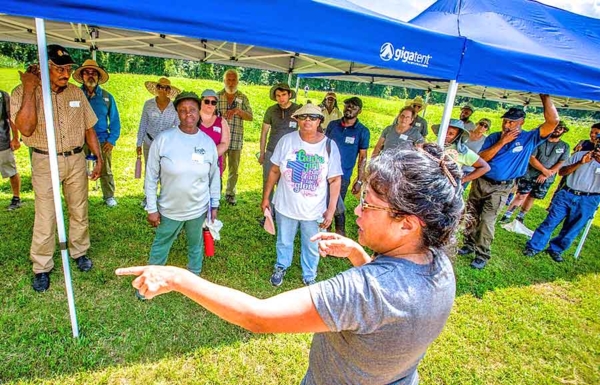
If you ask Kathleen Liang about the secret to operating a sustainable and profitable small farm, she has a simple answer: Everything starts with the soil.
“When the soil is healthy, then the crops will be OK,” she said. “You don’t need to spray. Take care of the soil. Everything starts with the soil.”
Liang, Ph.D., is W.K. Kellogg Distinguished Professor of sustainable agriculture at N.C. A&T and director of the Center for Environmental Farming Systems (CEFS) for N.C. A&T. Launched in 1994, CEFS is a unique partnership involving North Carolina’s two land-grant universities (N.C. A&T and NC State) and the NC Department of Agriculture and Consumer Services (NCDA&CS). Based at Cherry Research Farm in Goldsboro, a state-owned research station that includes more than 2,000 acres of farmland, CEFS was created as a cooperative venture to study environmentally sustainable farming practices in North Carolina. Today, it is a respected and nationally known center for research, education and Extension outreach in sustainable agriculture and community-based food systems.
CEFS research is organized into five farming programs called units and other affiliated programs working together to advance its mission of developing and promoting just and equitable farming systems that conserve natural resources, improve health and provide economic opportunities in North Carolina and beyond.
Betti Wiggins: School food, gardening hero
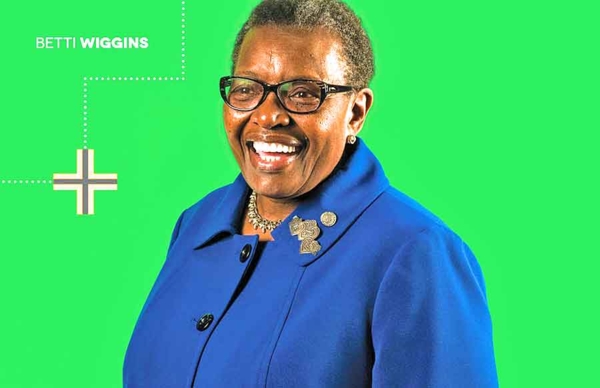
Betti Wiggins is recognized as one of the foremost authorities on school nutrition in the country. She’s been heralded as a “rebel” lunch lady and food/gardening hero in numerous features ranging from NBC News to National Geographic. She currently serves as an officer of Nutrition Services for Houston Independent School District and adviser for the agricultural college at Prairie View A&M University (PVAMU).
Wiggins oversees the Beyond the Plate Initiative with a Food and Agriculture Literacy Center housed on the 6-acre Mykawa working farm operated by district employees, students and undergraduate interns from PVAMU. The farm integrates nutrition and food science into its core curriculum and provides hands-on learning experiences. They have also partnered with Cooperative Extension to integrate the food challenge into their farm-to-school activities, develop Catcus Jack gardens across the district and implement summer camps.
Wiggins previously served as the executive director of the Office of School Nutrition for Detroit Public Schools Community District, where she established a Garden Collaborative in 2011. It grew to support more than 80 school-based gardens and a 2-acre school farm. Her work there earned extensive praise and positioned her as a transformer of school nutrition through innovative gardening practices.
Grafting technique cultivates 100-pound watermelons at university farm
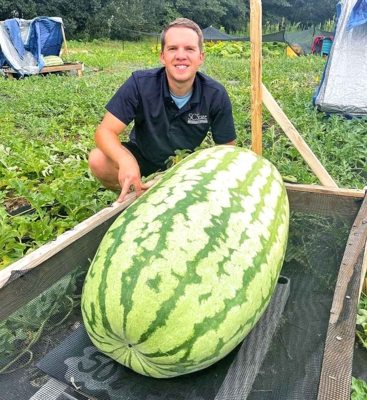
The SC State University 1890 Research & Extension sustainable agriculture and natural resources program is pushing the limits of growing watermelons by using innovative techniques to grow record-breaking watermelons at the 1890 Research & Demonstration Farm, located in Olar, South Carolina.
Led by Dr. Brandon Huber, controlled environment research scientist, the project serves as a demonstration to students and farmers to showcase various techniques that enhance yields and plant performance to optimize production. One of the techniques involves grafting, which combines two different plant varieties to create a single plant with combined traits. By merging watermelon plants with gourd plants, the gourd root system heightens disease resistance and enhances watermelon performance.
“There’s no secret to growing record-sized watermelons but rather a combined effort to optimize all inputs to maximize plant outputs,” Huber stated. “Watermelons grown using innovative grafting and gourd root system techniques can achieve sizes that challenge our understanding of what's possible in the world of agriculture."
In addition, Huber says managing growing conditions, weed control and protecting crops from extreme weather are considerations for growing the largest fruit possible. By implementing such strategies, Huber planted three watermelons at the Research & Demonstration Farm, which have a daily fruit gain of 5 pounds each. This innovative approach not only yields larger watermelons but also exemplifies ways science is reshaping the future of agriculture.
Out the Mud: Connecting Youth to Agricultural Opportunities
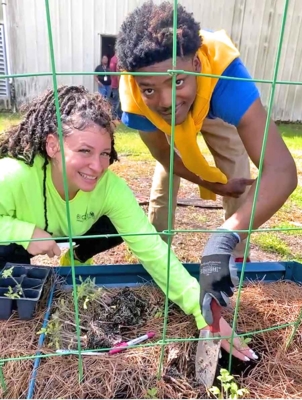
Through the U.S. Department of Agriculture's (USDA) National Institute of Food and Agriculture (NIFA) Capacity Building Grant Out the Mud: Connecting Youth to Agricultural Opportunities through Experiential Learning, the Southern University Agricultural Research and Extension Center (SUAREC) team, Stephanie Elwood, Kiyana Kelly, and Michael "Terra" Polite, teach horticulture to adjudicated and homeless teens in Louisiana.
At AMI Kids Youth Build, students aged 17-23 attend in pursuance of a GED, professional certifications and vocational training. The SUAREC team compliments the Youth Build program through a weekly Horticulture and Landscape Training program. Through this program, students partake in the upkeep of a 2,500-square-foot raised bed vegetable and herb and fruit tree garden space on their campus. The training covers seasonal planting, fertilization, weed maintenance, pest control and proper watering among other technical skills needed to keep a garden thriving. Participants are able to gain experience operating professional-grade landscaping tools such as weed eaters, backpack blowers, loppers, extended trimmers and lawn mowers.
At the end of the program, students receive a certificate of completion to utilize on job applications. This program allows non-traditional students to experience a hands-on trade that can be life-changing. Last year, the program had an 80% success rate for students gaining an ag-related job upon completion of the Out the Mud program.
For additional information on the Out of the Mud program, contact Stephanie Elwood at stephanie_elwood@suagcenter.com.
TSU Community Garden brings fresh food to Nashville
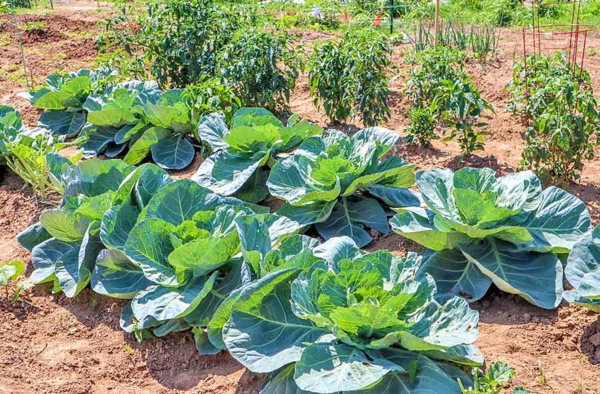
Gardening provides many people with a relaxing hobby and access to fresh food; however, in a city like Nashville, where space is limited, not everyone is able to keep a garden at their home or apartment. Enter the Tennessee State University Community Garden.
The TSU Community Garden, run by Dr. Arvazena Clardy, has provided members of the Nashville community with the opportunity to garden since 2011. The community garden moved to its current location - on the TSU farm - in 2014 and currently has 50 plots for participants.
Gardeners with plots in the community garden range in age from mid-20s to more than 70, and Clardy shared that many friendships have started among gardeners, with some even becoming fishing buddies. Gardeners use their plots to save money and feed their families. One gardener shared she has saved more than $500 through her participation in the community garden and that she cans any extra food she grows. Additionally, Clardy said that many gardeners use the community garden to build community by sharing food they’ve grown with friends and church members.
Those interested in participating in the community garden should attend a mandatory garden training in April led by Clardy.
Junior high school students prepare meal with produce grown in school garden
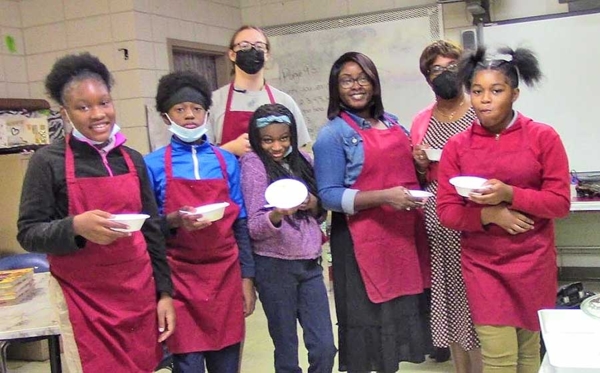
Students and teachers at Jack Robey Junior High School in Pine Bluff, Arkansas, recently prepared coleslaw made from produce grown in their own school garden. The food preparation activity was part of a science lesson planned in conjunction with the University of Arkansas at Pine Bluff (UAPB), said Dr. Karleah Harris, assistant professor for the UAPB Department of Human Sciences.
During the activity, Harris and undergraduate students of the human sciences degree program spoke to the junior high students about the health benefits of cabbage and the importance of growing fresh fruits and vegetables. Then, everyone got to pitch in and help in the preparation of the coleslaw. They shredded cabbage, mixed ingredients and finally sat down to enjoy the fruits of their labor.
“It was amazing to see how the students were excited to get to work preparing – and then eating – the coleslaw,” Harris said. “During the lesson, they all asked great questions that showed their appreciation for healthy foods. School activities related to nutrition education have the potential to positively influence students’ attitudes to eating more fruits and vegetables. Ultimately, this can help raise a generation of nutrition-conscious students, helping to transform the food system and combat the trend of food deserts.”
UMES Extension urban gardening project recognized as innovative
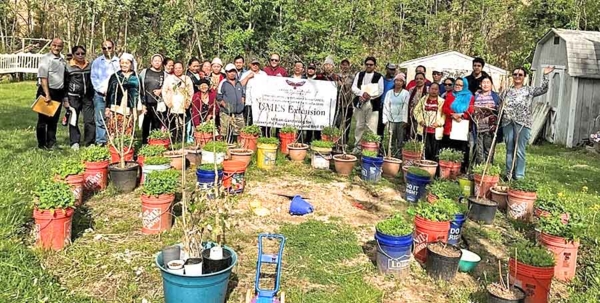
An urban gardening project involving minority farmers in the Greater Baltimore area earned a 2023 Multistate Urban Extension Innovation Award from the Association of Northeastern Extension Directors. The project experienced a six-fold increase in the number of participants in the past two years and is making an impact in the lives of Bhutanese Americans, many of whom live below the poverty line.
Spearheaded by Lila Karki, an assistant professor of agricultural economics and University of Maryland Eastern Shore (UMES) Extension specialist, the goal is to educate the small, socially disadvantaged farmers on farm production economics and management to strengthen their capacity.
UMES’ School of Agricultural and Natural Sciences is using 1890 funds for the project. Farmers receive support to promote “sustainable agricultural practices, improve productivity, reduce production costs and increase net farm income,” Karki said.
The project was presented at the 2023 National Urban Extension Leaders Northeast Regional Conference from June 14-16. The gardeners under the project are growing specialty and ethnic crops, including chili peppers, okra, stinging nettle, pointed melon/gourd, bitter melon/gourd, cowpeas, mustard greens, Colocasia, chayote, and ash and snake gourds. Workshops under the guidance of Extension specialists cover topics such as crop diversification, land preparation, application of manure, recordkeeping of farm activities, potential pests and diseases, and marketing fresh produce in the community.
WVSU 4-H cultivates seeds of knowledge through school garden partnership
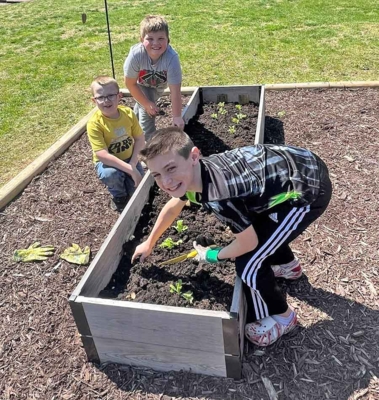
West Virginia State University 4-H has partnered with Ashford-Rumble Elementary School to create a gardening program led by WVSU Extension educator and WV Junior Master Gardener Coordinator Tiffany Ward. The team has provided supplies and plants to help build garden beds and educate students. The project aims to teach children about gardening while building soft skills, such as communication and leadership.
Implementation of the program has been categorized into two phases thus far, including constructing the garden, creating a preschool play area and pollinator area, and transforming the space into a permanent structure, a Monarch Waystation and more. The project is ongoing with plans to develop additional phases. The children are fully immersed in the gardening program and have worked hard to plant a variety of produce.
Projects like this benefit West Virginia in many ways, as many students in the area need access to fresh vegetables and herbs. Additional advantages are that teachers can incorporate the garden into their curriculum across all grade levels, and the school has harvested broccoli and other vegetables to use in their lunch salad bar, often replacing the need to purchase produce from an outside vendor.
1890 Extension on the Move
Kentucky State Mobile Units
Autoclave
Fruit and Vegetable Processing
Nutrition Kitchen
Sorghum
